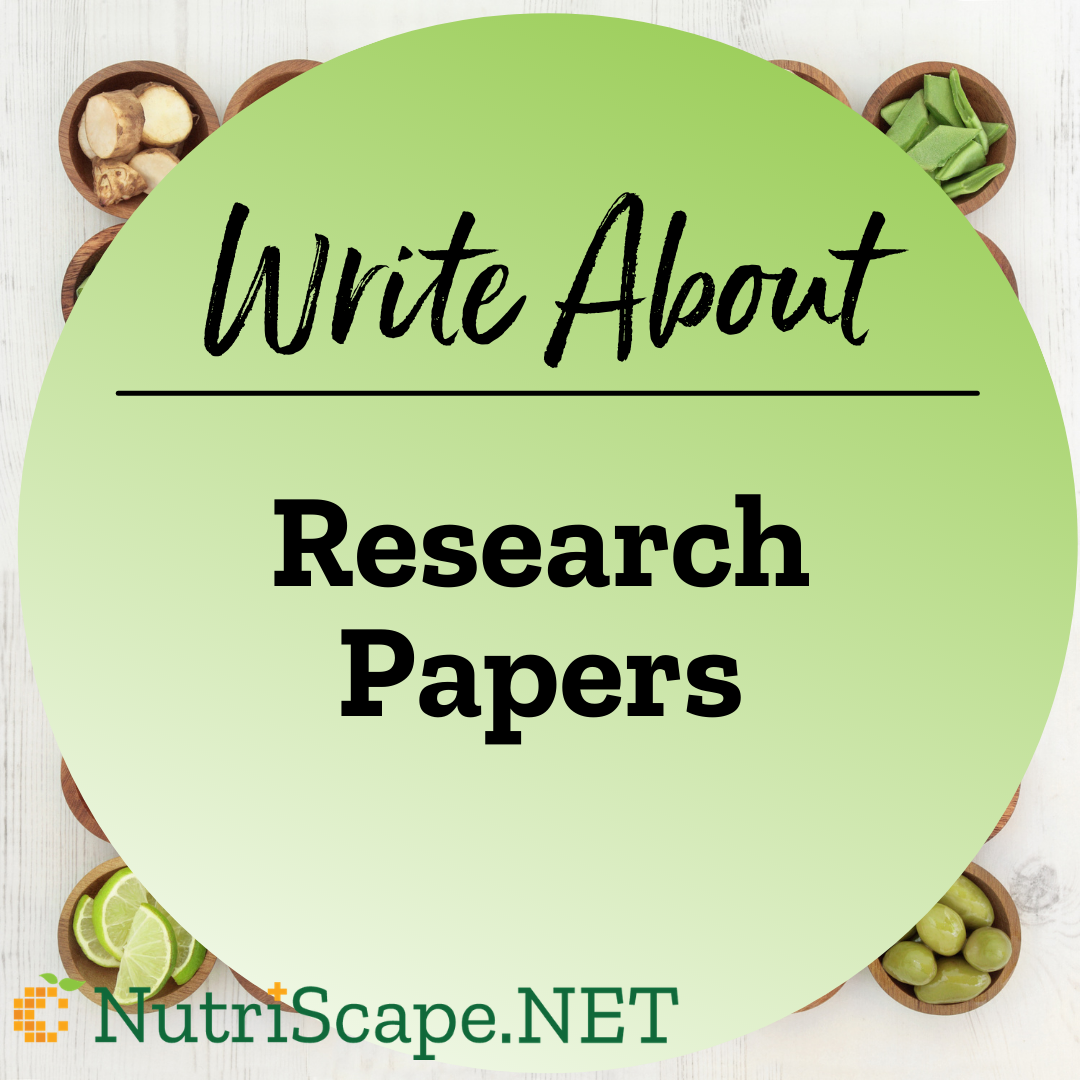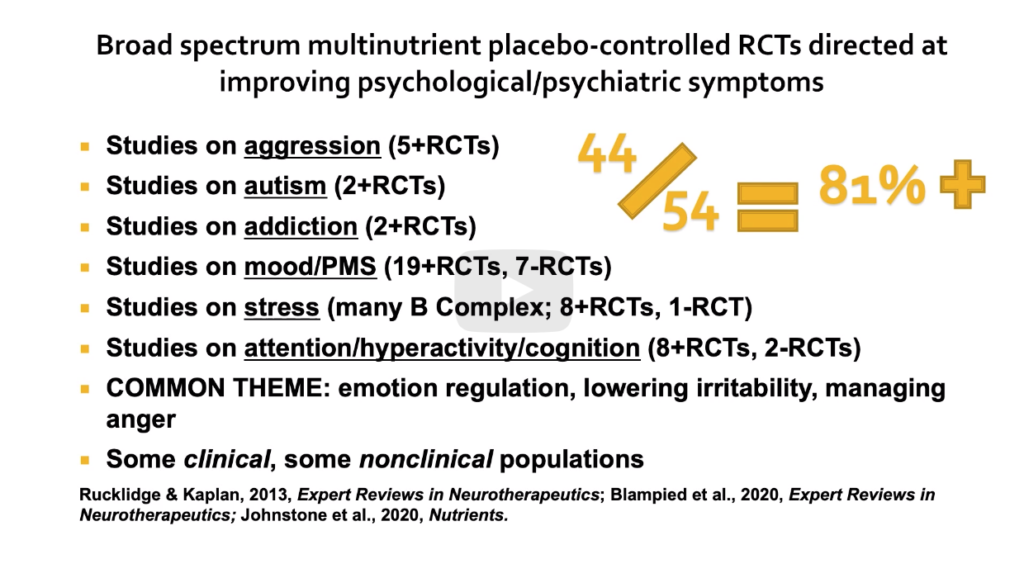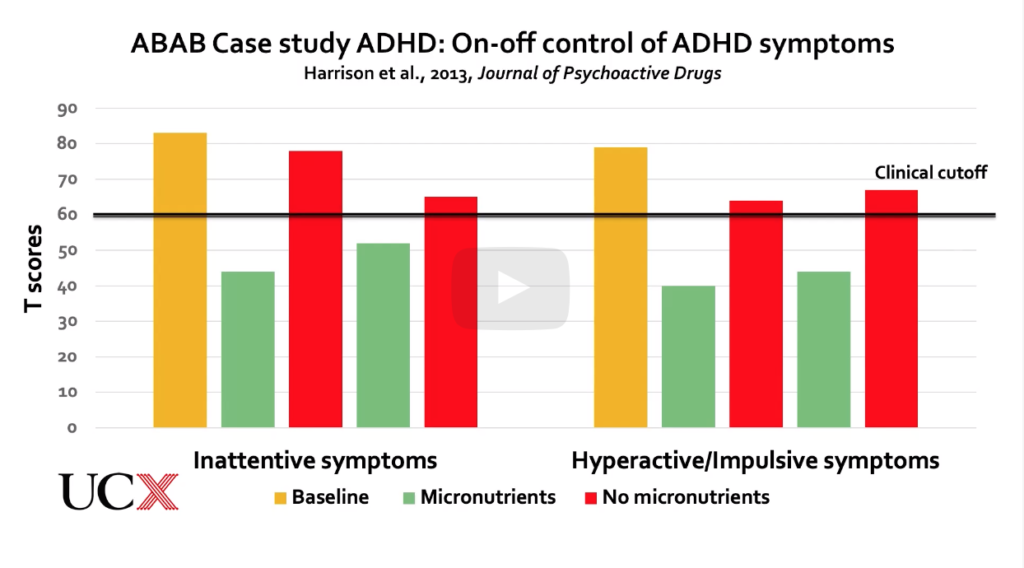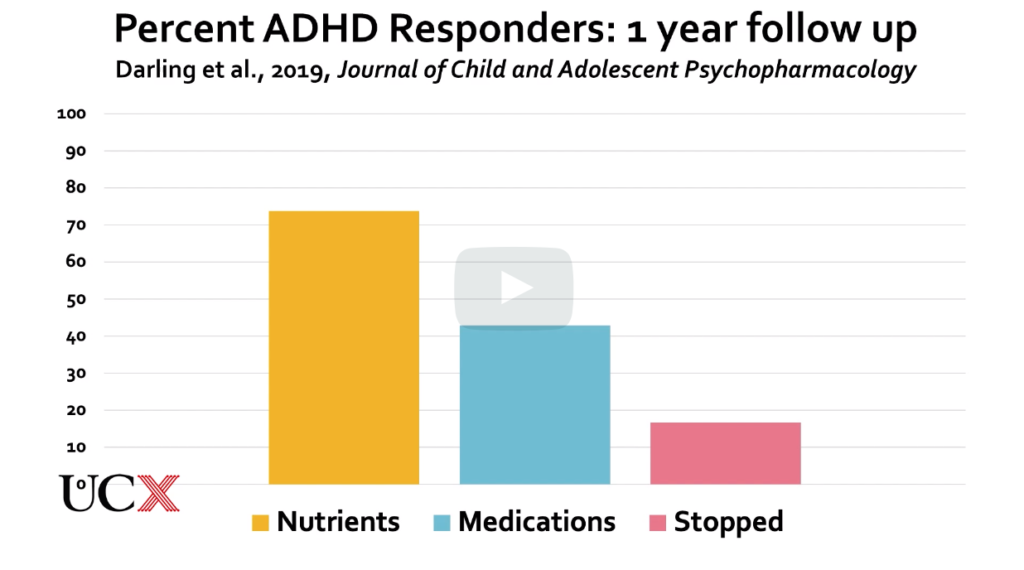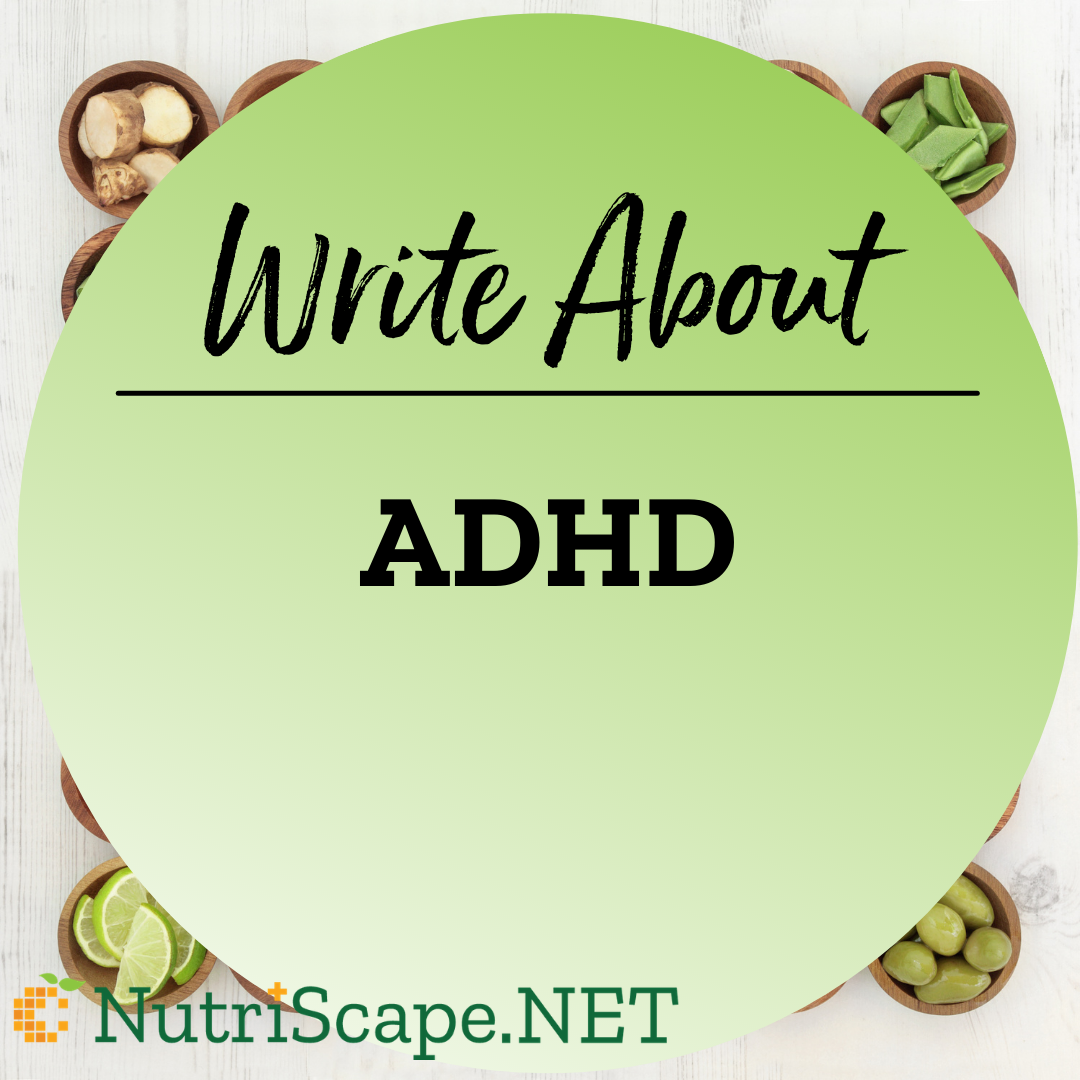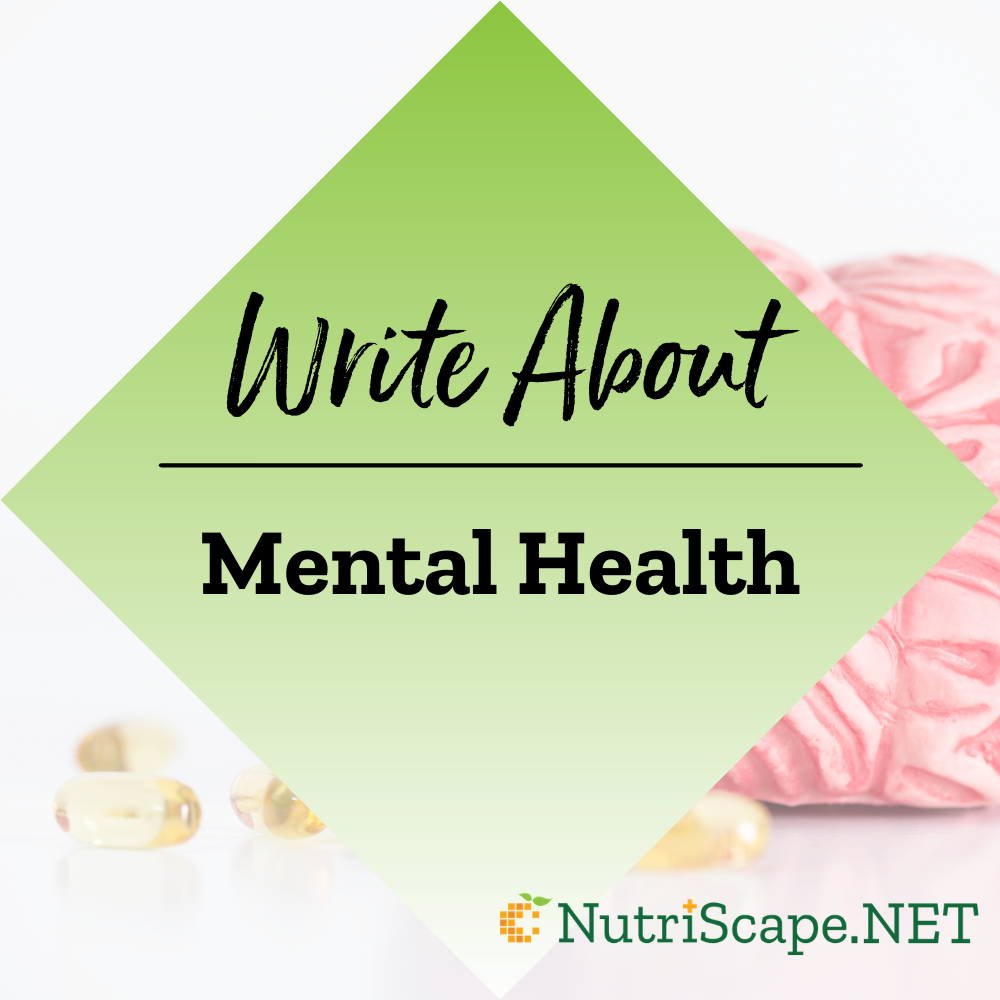
We came across this topic some time back and thought it would be good inspiration for a NutriScape.NET article written from the dietitian’s point of view. Here are some quick snippets you can follow.
Nutrition Supplements Studied For Mental Health
Source: UCx: PSY01ucX Course: Mental Health and Nutrition
- Course
- Progress
- Dates
- Course Syllabus
- Food Diary
- Bibliography
- Discussion
- Nutritional Supplements, current location
Nutritional Supplements
The most frequent question I get asked is: based on all of this research, what micronutrient formula should I take?
Below, I have compiled a list of ALL the micronutrient formulas that have been studied to treat a psychiatric or psychological problem. Note I have not included those preparations used for prevention of cognitive decline.
Each product listed below has at least one positive RCT to support its use. I have cited all the research behind the products mentioned (it is listed in ascending date order). PLEASE NOTE I DO NOT RECEIVE ANY MONEY FROM ANY OF THE COMPANIES THAT SELL MICRONUTRIENT PRODUCTS.
1. EMPower™, EMPowerplus™, and EMPowerplus Advanced™ (EMP)
www.truehope.com
For: ADHD, mood dysregulation, PMS, symptoms associated with trauma, aggression, depression, stress, anxiety.
For those taking the current EMP formulation for improving mental health symptoms, the dose stipulated on the bottle is two capsules twice a day (the dose recommended for general health). However, the dose more typically used in current research is at least four capsules twice a day. For those using these products for assisting with managing stress, our research after the earthquakes and floods showed that a therapeutic dose may be lower, such as four a day.
Research
- Kaplan, B. J., Simpson, J. S. A., Ferre, R. C., Gorman, C. P., McMullen, D. M., & Crawford, S. G. (2001). Effective mood stabilization with a chelated mineral supplement: An open-label trial in bipolar disorder. Journal of Clinical Psychiatry, 62(12), 936-944.
- Popper, C. W. (2001). Do vitamins or minerals (apart from lithium) have mood-stabilising effects? Journal of Clinical Psychiatry, 62(12), 933-935. https://www.psychiatrist.com/jcp/article/pages/2001/v62n12/v62n1203.aspx
- Kaplan, B. J., Crawford, S. G., Gardner, B., & Farrelly, G. (2002). Treatment of mood lability and explosive rage with minerals and vitamins: two case studies in children. Journal of Child and Adolescent Psychopharmacology, 12(3), 205-219.
- Simmons, M. (2003). Nutritional approach to bipolar disorder. Journal of Clinical Psychiatry, 64(3), 338.
- Kaplan, B. J., Fisher, J. E., Crawford, S. G., Field, C. J., & Kolb, B. (2004). Improved mood and behavior during treatment with a mineral-vitamin supplement: an open-label case series of children. Journal of Child and Adolescent Psychopharmacology, 14(1), 115-122.
- Rucklidge, J. J. (2009). Successful treatment of OCD with a micronutrient formula following partial response to CBT: A case study. Journal of Anxiety Disorders, 23, 836–840.
- Gately, D., & Kaplan, B.J. (2009). Database analysis of adults with bipolar disorder consuming a micronutrient formula. Clinical Medicine: Psychiatry. http://la-press.com/article.php?article_id=1384
- Frazier, E.A., Fristad, M., & Arnold, L.E. (2009). Multinutrient Supplement as Treatment: Literature Review and Case Report of a 12-year-old Boy with Bipolar Disorder. Journal of Child and Adolescent Psychopharmacology, 19, 453-460.
- Rucklidge, J. J., & Harrison, R. (2010). Successful treatment of Bipolar Disorder II and ADHD with a micronutrient formula: A case study. CNS Spectrums, 15(5), 289-295.
- Mehl-Madrona, L., Leung, B., Kennedy, C., Paul, S. & Kaplan, B. J. (2010). A naturalistic case-control study of micronutrients versus standard medication management in autism. Journal of Child and Adolescent Psychopharmacology, 20(2), 95-103. https://www.ncbi.nlm.nih.gov/pubmed/20415604
- Rucklidge, J. J., Gately, D., & Kaplan, B. J. (2010). Database Analysis of Children and Adolescents with Bipolar Disorder Consuming a Micronutrient Formula. BMC Psychiatry, 10, 17. http://www.biomedcentral.com/1471-244X/10/74
- Rucklidge, J. J., Taylor, M. R., Whitehead, K. A. (2011). Effect of micronutrients on behaviour and mood in adults with ADHD: Evidence from an 8-week open label trial with natural extension. Journal of Attention Disorders, 15(1), 79-91.
- Rucklidge, J. J., Johnstone, J., Harrison, R. (2011). Effect of micronutrients on neurocognitive functioning in adults with ADHD and Severe Mood Dysregulation: A pilot study. Journal of Complementary and Alternative Medicine, 17(12), 1-7. https://www.ncbi.nlm.nih.gov/pubmed/22112202
- Rucklidge, J. J., & Blampied, N. M. (2011). Post earthquake functioning in adults with Attention-Deficit/Hyperactivity Disorder: Positive effects of micronutrients on resilience. New Zealand Journal of Psychology, 40(4), 51-57.
- Rucklidge, J. J., Johnstone, J., Harrison, R., & Boggis, A. (2011). Micronutrients reduce stress and anxiety following a 7.1 earthquake in adults with Attention-Deficit/Hyperactivity Disorder. Psychiatry Research, 189, 281-287. doi:10.1016/j.psychres.2011.06.016
- Simpson, J. S. A., Crawford, S. G., Goldstein, E. T., Field, C., Burgess, E., & Kaplan, B. J. (2011). Systematic review of safety and tolerability of a complex micronutrient formula used in mental health. BMC Psychiatry, 11(62). http://www.biomedcentral.com/1471-244X/11/62
- Rodway, M., Vance, A., Watters, A., Lee, H., Bos, E., & Kaplan, B. J. (2012). Efficacy and cost of micronutrient treatment of childhood psychosis. BMJ Case Reports, 10.1136/bcr-2012-007213. https://doi.org/10.1136/bcr-2012-007213
- Rucklidge, J. J., Andridge, R., Gorman, B., Blampied, N., Gordon, H. & Boggis, A. (2012). Shaken but unstirred? Effects of micronutrients on stress and trauma after an earthquake: RCT evidence comparing formulas and doses. Human Psychopharmacology: Clinical and Experimental, 27(5), 440-454. https://www.ncbi.nlm.nih.gov/pubmed/22782571
- Frazier, E.A., Fristad, M.A. & Arnold, L.E. (2012). Feasibility of a nutritional supplement as treatment for pediatric bipolar spectrum disorders. Journal of Complementary and Alternative Medicine, 18, 678-85.
- Harrison, R., Rucklidge, J. J., & Blampied, N. (2013). Use of micronutrients attenuates cannabis and nicotine abuse as evidenced from a reversal design: A case study. Journal of Psychoactive Drugs, 45(2), 1-11. https://www.ncbi.nlm.nih.gov/pubmed/23909004
- Frazier, E. A., Gracious, B., Arnold, L. E., Failla, M., Chitchumroonchokchai, C., Habash, D., & Fristad, M. A. (2013). Nutritional and safety outcomes from an open-label micronutrient intervention for pediatric bipolar spectrum disorders. Journal of Child and Adolescent Psychopharmacology, 23(8), 558-567. doi:10.1089/cap.2012.0098
- Rucklidge, J. J. (2013). Could yeast infections impair recovery from mental illness? A case study using micronutrients and olive leaf extract for the treatment of ADHD and depression. Advances in Mind-Body Medicine, 27(3), 14-18. https://www.ncbi.nlm.nih.gov/pubmed/23784606
- Rucklidge, J. J., Blampied, N., Gorman, B., Gordon, H., & Sole, E. (2014). Psychological functioning one year after a brief intervention using micronutrients to treat stress and anxiety related to the 2011 Christchurch earthquakes: A naturalistic follow-up. Human Psychopharmacology: Clinical and Experimental, 29(3), 230-243. https://www.ncbi.nlm.nih.gov/pubmed/24554519
- Rucklidge, J. J., Frampton, C. M., Gorman, B., & Boggis, A. (2014). Vitamin-mineral treatment of attention-deficit hyperactivity disorder in adults: double-blind randomised placebo-controlled trial. British Journal of Psychiatry, 204(4), 306-315. https://doi.org/10.1192/bjp.bp.113.132126
- Rucklidge, J. J., Johnstone, J., Gorman, B., & Boggis, A., & Frampton, C. (2014). Moderators of treatment response in adults with ADHD to micronutrients: demographics and biomarkers. Progress in Neuro-Psychopharmacology and Biological Psychiatry, 50, 163–171. https://www.ncbi.nlm.nih.gov/pubmed/24374068
- Gordon, H. A., Rucklidge, J. J., Blampied, N. M., & Johnstone, J. M. (2015). Clinically Significant Symptom Reduction in Children with Attention-Deficit/Hyperactivity Disorder Treated with Micronutrients: An Open-Label Reversal Design Study. Journal of Child and Adolescent Psychopharmacology, 25(10), 783-798. doi: 10.1089/cap.2015.0105 https://www.ncbi.nlm.nih.gov/pubmed/26682999
- Kaplan, B. J., Hilbert, P., & Tsatsko, E. (2015). Micronutrient treatment for children with emotional and behavioral dysregulation: a case series. Journal of Medical Case Reports, 9:240. http://www.jmedicalcasereports.com/content/pdf/s13256-015-0735-0.pdf
- Kaplan, B. J., Rucklidge, J. J., Romijn, A. R., & Dolph, M. (2015). A randomized trial of nutrient supplements to minimize psychological stress after a natural disaster. Psychiatry Research, 228, 373-379. http://www.ncbi.nlm.nih.gov/pubmed/26154816
- Kaplan BJ, Leaney C, Tsatsko E (2016). Micronutrient treatment of emotional dyscontrol following traumatic brain injury: A case study. Annals of Psychiatry and Mental Health, 4(5): 1078. https://www.jscimedcentral.com/Psychiatry/psychiatry-4-1078.pdf
- Retallick-Brown, H., Rucklidge, J. J., & Blampied, N. (2016). Study protocol for a randomised double blind, treatment control trial comparing the efficacy of a micronutrient formula to a single vitamin supplement in the treatment of premenstrual syndrome. Medicines, 3, 32. http://www.mdpi.com/2305-6320/3/4/32
- Rucklidge, J. J., Frampton, C., Gorman, B., & Boggis, A. (2017). Vitamin-mineral treatment of ADHD in adults: A one year follow up of a randomized controlled trial. Journal of Attention Disorders, 21(6), 522-532. http://journals.sagepub.com/doi/pdf/10.1177/1087054714530557
- Sole, E. J., Rucklidge, J. J., & Blampied, N. M. (2017). Anxiety and Stress in Children Following an Earthquake: Clinically Beneficial Effects of Treatment with Micronutrients. Journal of Child and Family Studies, 1-10. doi: 10.1007/s10826-016-0607-2 https://link.springer.com/article/10.1007%2Fs10826-016-0607-2
- Kaplan, B. J., Isaranuwatchai, W., & Hoch, J. S. (2017). Hospitalization cost of conventional psychiatric care compared to broad-spectrum micronutrient treatment: literature review and case study of adult psychosis. International Journal of Mental Health Systems, 11, 14. https://link.springer.com/article/10.1186/s13033-017-0122-x
- Mehl-Madrona, L., & Mainguy, B. (2017). Adjunctive Treatment of Psychotic Disorders with Micronutrients. Journal of Alternative and Complementary Medicine. 23(7): 526-533. http://online.liebertpub.com/doi/10.1089/acm.2016.0215
- Retallick-Brown, H., Blampied, N., & Rucklidge, J. J. (2020). A Pilot Randomized Treatment-Controlled Trial Comparing Vitamin B6 with Broad-Spectrum Micronutrients for Premenstrual Syndrome. Journal of Alternative and Complementary Medicine. doi:10.1089/acm.2019.0305. https://www.ncbi.nlm.nih.gov/pubmed/31928364
2. Daily Essential Nutrients*™ (DEN)
www.hardynutritionals.com
For: ADHD, smoking cessation, emotional dysregulation, symptoms associated with trauma, aggression, depression, stress, anxiety
*Prior to 2013, there was just one formula and it was manufactured by TrueHope. From 2013 onward, Hardy Nutritionals produced Daily Essential Nutrients while TrueHope continued to produce EMP+. Therefore, the ingredients of DEN are very similar to EMP+ in both breadth and dose. Some modifications have been made to both formulas over the ensuing decade. For updated information on current formulas, see the manufacturers’ websites.
A full daily dose for improving psychiatric symptoms with DEN is four capsules three times a day (twelve/day) and this is the dose that has been the most used in the cited research. Hardy Nutritionals has a product called Optimal Balance® designed for people just seeking a little additional nutrient support to manage stress or insomnia. The typical daily dose is three twice a day (six/day).
DEN is a better choice than Optimal Balance® for those with more serious psychiatric problems and/or if taking the nutrients alongside psychiatric medications, where they may want to consult with the company product specialists regarding their own situation.
Research
- Lothian, J., Blampied, N., & Rucklidge, J. (2016). Effect of Micronutrients on Insomnia in Adults: A Multiple-Baseline Study. Clinical Psychological Science, 4(6), 1112-1124. https://doi.org/10.1177/2167702616631740
- Blampied, M., Bell, C., Gilbert, C., Boden, J., Nicholls, R., Rucklidge, J. J. (2018) Protocol for a Randomized Double Blind, Placebo Control Trial Exploring the Effectiveness of a Micronutrient Formula in improving symptoms of Anxiety and Depression. Medicines. 5(2), 56. http://www.mdpi.com/2305-6320/5/2/56
- Rucklidge, J. J., Eggleston, M., Johnstone, J. M., Darling, K., & Frampton, C. M. (2018). Vitamin-mineral treatment improves aggression and emotional regulation in children with ADHD: A fully-blinded, randomized, placebo-controlled trial. Journal of Child Psychology and Psychiatry, 59(3), 232-246. http://onlinelibrary.wiley.com/doi/10.1111/jcpp.12817/full
- Stevens, A., Rucklidge, J. J., Eggleston, M., Darling, K., & Kennedy, M. (2018). Methylomic changes in response to micronutrient supplementation and MTHFR genotype. Epigenomics, 10(8), 1201-1214. https://www.futuremedicine.com/doi/10.2217/epi-2018-0029
- Reihana, P., Blampied, N., & Rucklidge, J. (2018). Novel Mineral–Vitamin Treatment for Reduction in Cigarette Smoking: A Fully Blinded Randomized Placebo-Controlled Trial. Nicotine & Tobacco Research, 21(11), 1496-1505. https://doi.org/10.1093/ntr/nty168
- Rucklidge, J. J., Eggleston, M. J. F., Ealam, B., Beaglehole, B., & Mulder, R. T. (2019). An Observational Preliminary Study on the Safety of Long-Term Consumption of Micronutrients for the Treatment of Psychiatric Symptoms. Journal of Alternative and Complementary Medicine. doi:10.1089/acm.2018.0352 https://www.liebertpub.com/doi/10.1089/acm.2018.0352
- Rucklidge, J. J., Eggleston, M., Johnstone, J. M., Darling, K., Stevens, A. J., Kennedy, M. A., & Frampton, C. M. (2019). Can we predict treatment response in children with ADHD to a vitamin-mineral supplement? An investigation into pre-treatment nutrient serum levels, MTHFR status, clinical correlates and demographic variables. Progress in Neuropsychopharmacology & Biological Psychiatry, 89, 181-192. https://www.sciencedirect.com/science/article/pii/S027858461830407X?via%3Dihub
- Borlase, N., Melzer, T. R., Eggleston, M. J. F., Darling, K. A., & Rucklidge, J. J. (2019). Resting-state networks and neurometabolites in children with ADHD after 10 weeks of treatment with micronutrients: results of a randomised placebo-controlled trial. Nutritional Neuroscience, 1-11. doi:10.1080/1028415X.2019.1574329 https://www.tandfonline.com/doi/full/10.1080/1028415X.2019.1574329
- Stevens, A. J., Purcell, R. V., Darling, K. A., Eggleston, M. J. F., Kennedy, M. A., & Rucklidge, J. J. (2019). Human gut microbiome changes during a 10 week Randomised Control Trial for micronutrient supplementation in children with attention deficit hyperactivity disorder. Scientific Reports, 9(1), 10128. doi:10.1038/s41598-019-46146-3 https://www.nature.com/articles/s41598-019-46146-3
- Darling, K. A., Eggleston, M. J. F., Retallick-Brown, H., & Rucklidge, J. J. (2019). Mineral-Vitamin Treatment Associated with Remission in Attention-Deficit/Hyperactivity Disorder Symptoms and Related Problems: 1-Year Naturalistic Outcomes of a 10-Week Randomized Placebo-Controlled Trial. Journal of Child and Adolescent Psychopharmacology. doi:10.1089/cap.2019.0036 https://www.ncbi.nlm.nih.gov/pubmed/31343273
- Johnstone, J. M., Leung, B., Gracious, B., Perez, L., Tost, G., Savoy, A., . . . Arnold, L. E. (2019). Rationale and design of an international randomized placebo-controlled trial of a 36-ingredient micronutrient supplement for children with ADHD and irritable mood: The Micronutrients for ADHD in Youth (MADDY) study. Contemporary clinical trials communications, 16, 100478-100478. doi:10.1016/j.conctc.2019.100478 https://www.ncbi.nlm.nih.gov/pmc/articles/PMC6859218/
- Bradley, H. A., Campbell, S. A., Mulder, R. T., Henderson, J. M. T., Dixon, L., Boden, J. M., & Rucklidge, J. J. (2020). Can broad-spectrum multinutrients treat symptoms of antenatal depression and anxiety and improve infant development? Study protocol of a double blind, randomized, controlled trial (the ‘NUTRIMUM’ trial). BMC Pregnancy and Childbirth, 20(1), 488. https://doi.org/10.1186/s12884-020-03143-z
- Hughes, S., Rondeau, M., Shannon, S., Sharp, J., Ivins, G., Lee, J., Taylor, I., & Bendixsen, B. (2020). A Holistic Self-learning Approach for Young Adult Depression and Anxiety Compared to Medication-Based Treatment-As-Usual. Community Mental Health Journal. https://doi.org/10.1007/s10597-020-00666-9
- Rucklidge, J. J., Afzali, M. U., Kaplan, B. J., Bhattacharya, O., Blampied, F. M., Mulder, R. T., & Blampied, N. M. (2021). Massacre, Earthquake, Flood: Massacre, Earthquake, Flood: Translational science evidence that the use of micronutrients post-disaster reduces the risk of post-traumatic stress in survivors of disasters. International Perspectives in Psychology, 10(1), 39-54. https://doi.org/10.1027/2157-3891/a000003
| NOTES on DEN and EMP: Both are available as powders for mixing into juice, for those who cannot swallow capsules. Also, some people are very sensitive to the smell of dietary supplements. If the smell of the capsules is a problem, try keeping them in the fridge or freezer. Pre-pubertal children may take a lower dose (4 twice a day), although research studies have sometimes gone up to the full adult dose for treating childhood ADHD. As children enter their teenage years, research has shown that the dose may need to be increased to maintain symptom control.Finally, the doses mentioned above are mostly based on research with people who were not taking any psychiatric medications (e.g., antidepressants, anxiolytics, stimulants) because up to this point, most studies have excluded people taking these medications. The large number of pills does not imply that the micronutrient dosing is high. Many commercial products contain a broad spectrum of micronutrients in one or two capsules daily, but the nutrients are present in chemical forms that are poorly absorbed. One way to enhance bioavailability of the minerals is to deliver them in chelated forms (chelation promotes passage from the gut into the blood stream, where the minerals dissociate from the chelates), but the chelated minerals are bulky and cannot be condensed into one or two capsules. Furthermore, some broad-spectrum formulations also provide macro-minerals, such as calcium, magnesium, and phosphorus, which are often under-represented in diets and are required in much larger bulk quantities than micronutrients. Products containing chelated microminerals and bulky macrominerals require more pills each day, are more expensive, but will likely be more effective than regular formulations. |
3. Brain Child Spectrum Support/ANRC Essentials
http://www.brainchildnutritionals.com/spectrum-support-vitamins.html/ or http://www.autismnrc.org/anrc-essentials
For: autism
Professor Jim Adams at Arizona State University has conducted a number of studies using nutrients for the treatment of autism, using three products: Spectrum Support II/IIITM, SyndionTM, and ANRC Essentials PlusTM (a revised version of SyndionTM). Spectrum Support comes as a capsule or colloidal suspension–the standard dose is two capsules (or two teaspoons) twice a day. For ANRC Essentials PlusTM, the company provides information on how to gradually increase to the optimal dose based on body weight. The formula comes either as capsules or a powder to mix with your favorite juice (they suggest orange, mango, or cranberry).
Research
- Adams, J. B., & Holloway, C. (2004). Pilot study of a moderate dose multivitamin/mineral supplement for children with autism spectrum disorder. Journal of Alternative and Complementary Medicine, 10(6), 1033-1039. http://online.liebertpub.com/doi/abs/10.1089/acm.2004.10.1033
- Adams, J. B., Audhya, T., McDonough-Means, S., Rubin, R. A., Quig, D., Geis, E., Gehn, E., Loresto, M., Mitchell, J., Atwood, S., Barnhouse, S., & Lee, W. (2011). Effect of a vitamin/mineral supplement on children and adults with autism. BMC Pediatrics, 11, 111. https://doi.org/10.1186/1471-2431-11-111
- Adams, J. B., Audhya, T., Geis, E., Gehn, E., Fimbres, V., Pollard, E., Mitchell, J., Ingram, J., Hellmers, R., Laake, D., Matthews, J., Li, K., Naviaux, J., Naviaux, R., Adams, R., Coleman, D., & Quig, D. (2018). Comprehensive Nutritional and Dietary Intervention for Autism Spectrum Disorder—A Randomized, Controlled 12-Month Trial. Nutrients, 10(3), 369. http://www.mdpi.com/2072-6643/10/3/369
4. Forceval
http://www.forceval.co.uk
For: aggression in prisoners
Forceval is available in a capsule or in effervescent tablets and is a licensed medicine in the UK. The recommended dose is one capsule daily. The main target for the formula is to combat malnutrition. However, Forceval has been used along with fish oil for omega 3s to successfully reduce aggression in people incarcerated in prisons. There were no adverse reactions.
Research
- Gesch CB., Hammond SM, Hampson SE, et al. (2002). The British Journal of Psychiatry, 181(1) 22-28; doi: 10.1192/bjp.181.1.22
5. Bayer’s Berocca
http://www.berocca.com/en/home.php
For: stress/anxiety
Berocca is the most studied B-complex formula for reduction of stress. It can be taken as a capsule or an effervescent tablet that you add to water. It has been studied primarily in people drawn from the general population. No concerning side effects have been reported.
Research
- Carroll, D., Ring, C., Suter, M., & Willemsen, G. (2000). The effects of an oral multivitamin combination with calcium, magnesium, and zinc on psychological well-being in healthy young male volunteers: a double-blind placebo-controlled trial. Psychopharmacology, 150(2), 220-225. https://doi.org/doi:10.1007/s002130000406
- Schlebusch, L., Bosch, B. A., Polglase, G., Kleinschmidt, I., Pillay, B. J., & Cassimjee, M. H. (2000). A double-blind, placebo-controlled, double-centre study of the effects of an oral multivitamin-mineral combination on stress. South African Medical Journal, 90(12), 1216-1223. https://www.ncbi.nlm.nih.gov/pubmed/11234653
- Kennedy, D. O., Haskell, C. F., Robertson, B., Reay, J., Brewster-Maund, C., Luedemann, J., Maggini, S., Ruf, M., Zangara, A., & Scholey, A. B. (2008). Improved cognitive performance and mental fatigue following a multi-vitamin and mineral supplement with added guarana (Paullinia cupana). Appetite, 50(2-3), 506-513. https://doi.org/10.1016/j.appet.2007.10.007
- Kennedy, D., Veasey, R., Watson, A., Dodd, F., Jones, E., Maggini, S., & Haskell, C. (2010). Effects of high-dose B vitamin complex with vitamin C and minerals on subjective mood and performance in healthy males. Psychopharmacology, 211(1), 55-68. https://doi.org/doi:10.1007/s00213-010-1870-3
- Rucklidge, J. J., Andridge, R., Gorman, B., Blampied, N., Gordon, H., & Boggis, A. (2012). Shaken but unstirred? Effects of micronutrients on stress and trauma after an earthquake: RCT evidence comparing formulas and doses. Human Psychopharmacology, 27(5), 440-454. https://doi.org/10.1002/hup.2246
- Scholey, A., Bauer, I., Neale, C., Savage, K., Camfield, D., White, D., Maggini, S., Pipingas, A., Stough, C., & Hughes, M. (2013). Acute effects of different multivitamin mineral preparations with and without Guarana on mood, cognitive performance and functional brain activation. Nutrients, 5(9), 3589-3604. https://doi.org/10.3390/nu5093589
- White, D., Cox, K., Peters, R., Pipingas, A., & Scholey, A. (2015). Effects of Four-Week Supplementation with a Multi-Vitamin/Mineral Preparation on Mood and Blood Biomarkers in Young Adults: A Randomised, Double-Blind, Placebo-Controlled Trial. Nutrients, 7(11), 5451. http://www.mdpi.com/2072-6643/7/11/5451
6. Swisse Ultivite
http://www.swisse.com/au/vitamins-and-supplements/mens-health/73/swisse-mens-ultivite-f1
For: stress
Swisse UltiviteTM is available in both a women and men’s version and is taken as one capsule daily with a meal. Several studies support its use for reduction of stress in otherwise healthy people. No side effects were reported.
Research
- Harris, E., Kirk, J., Rowsell, R., Vitetta, L., Sali, A., Scholey, A., & Pipingas, A. (2011). The effect of multivitamin supplementation on mood and stress in healthy older men. Human Psychopharmacology, 26(8), 560-567. https://doi.org/10.1002/hup.1245
- Harris, E., Macpherson, H., Vitetta, L., Kirk, J., Sali, A., & Pipingas, A. (2012). Effects of a multivitamin, mineral and herbal supplement on cognition and blood biomarkers in older men: A randomised, placebo‐controlled trial. Human Psychopharmacology: Clinical and Experimental, 27(4), 370-377. https://doi.org/10.1002/hup.2236
- Sarris J, Cox, KH M, Camfield DA, et al. (2012). Participant experiences from chronic administration of a multivitamin versus placebo on subjective health and wellbeing: A double-blind qualitative analysis of a randomized controlled trial. Nutrition Journal, 11, 110. http://doi.org/10.1186/1475-2891-11-110
- Pipingas, A., Camfield, D. A., Stough, C., Cox, K. H., Fogg, E., Tiplady, B., Sarris, J., White, D. J., Sali, A., Wetherell, M. A., & Scholey, A. B. (2013). The effects of multivitamin supplementation on mood and general well-being in healthy young adults. A laboratory and at-home mobile phone assessment. Appetite, 69, 123-136. https://doi.org/10.1016/j.appet.2013.05.016
- Camfield, D. A., Wetherell, M. A., Scholey, A. B., Cox, K. H., Fogg, E., White, D. J., Sarris, J., Kras, M., Stough, C., Sali, A., & Pipingas, A. (2013). The effects of multivitamin supplementation on diurnal cortisol secretion and perceived stress. Nutrients, 5(11), 4429-4450. https://doi.org/10.3390/nu5114429
- Macpherson, H., Rowsell, R., Cox, K. H., Scholey, A., & Pipingas, A. (2015). Acute mood but not cognitive improvements following administration of a single multivitamin and mineral supplement in healthy women aged 50 and above: a randomised controlled trial. Age (Dordr), 37(3), 9782. https://doi.org/10.1007/s11357-015-9782-0
7. Blackmores Executive B
http://www.blackmores.com.au/products/executive-b-stress-formula
For: stress
Blackmores is taken as one capsule twice a day with meals. One study showed improved work-related stress. It is also available as an immediate-release and sustained-release capsule. No side effects have been reported.
Research
- Stough, C., Scholey, A., Lloyd, J., Spong, J., Myers, S., & Downey, L. A. (2011). The effect of 90 day administration of a high dose vitamin B-complex on work stress. Human Psychopharmacology: Clinical and Experimental, 26(7), 470-476. https://doi.org/10.1002/hup.1229
8. Enlyte
For: depression
There has been one study using Enlyte to treat people with a variant of the MTHFR gene who also had major depression. The treatment consists of one capsule taken on an empty stomach. It is available by prescription and may be covered by insurance in the US. No reported side effects.
Research
- Mech A, Farah A. Correlation of clinical response with homocysteine reduction during therapy with reduced B vitamins in patients with MDD who are positive for MTHFR C677T or A1298C polymorphism: a randomized, double-blind, placebo-controlled study. Journal of Clinical Psychiatry. 2016 May;77(5):668-71. doi:10.4088/JCP.15m10166.
9. Optivite
www.optimox.com
For: premenstrual symptoms
Optivite was first studied in the 1980s and as far as I am aware, there have been no new studies for the last two decades. The product is still available for purchase. The studies suggested between six and twelve capsules a day. The bottle recommends two-to-six tablets daily with meals. The main concern raised about taking a dose above ten capsules is that it delivers vitamin B6 in a range that can produce some neurological side effects, including tingling of limbs. Fortunately, the side effect is reversible once you stop taking the pills.
Research
- Chakmakjian, Z. H., Higgins, C. E., & Abraham, G. E. (1985). The effect of a nutritional supplement, Optivite for women, on premenstrual tension syndromes. II. Effect on symptomatology, using a double blind cross-over design. The Journal of Applied Nutrition, 37(1), 12-17.
- London, R. S., Bradley, L., & Chiamori, N. Y. (1991). Effect of a nutritional supplement on premenstrual symptomatology in women with premenstrual syndrome: a double-blind longitudinal study. Journal of the American College of Nutrition, 10(5), 494-499. doi:10.1080/07315724.1991.10718176
Other publications: reviews and letters to editors
- Rucklidge, J. J., Johnstone, J., & Kaplan, B. J. (2009). Nutrient supplementation approaches in the treatment of ADHD. Expert Review of Neurotherapeutics, 9(4), 461-476.
- Gardner, A., Kaplan, B. J., Rucklidge, J. J., Jonsson, B. H., & Humble, M. B. (2010). The potential of nutritional therapy. Science (letter), 327, 268.
- Kaplan, B. J., Nikkel, G., Nikkel, B., & Rucklidge, J. J. (2013). Keeping Academic Psychiatry Relevant. British Journal of Psychiatry (letter). http://bjp.rcpsych.org/content/201/6/421/reply#bjprcpsych_el_53864
- Rucklidge, J. J., & Kaplan, B. J. (2013). Broad-spectrum micronutrient formulas for the treatment psychiatric symptoms: A systematic review. Expert Review of Neurotherapeutics, 13(1), 49-73.
- Rucklidge, J. J., Johnstone, J., & Kaplan, B. J. (2013). Single bullet madness – why do we continue to perpetuate this fallacy? (letter). British Journal of Psychiatry, 203, 154-155. http://bjp.rcpsych.org/content/202/6/398/reply#bjprcpsych_el_54588
- Popper, C. W. (2014). Single-Micronutrient and Broad-Spectrum Micronutrient Approaches for Treating Mood Disorders in Youth and Adults. Child and Adolescent Psychiatric Clinics of North America, 23(3), 591-672. doi:10.1016/j.chc.2014.04.001
- Rucklidge, J. J., Harris, A., & Shaw, I. (2014). Are the amounts of vitamins in commercially available dietary supplement formulations relevant for the management of psychiatric disorders in children? New Zealand Journal of Medicine, 127, 73-85. https://www.nzma.org.nz/journal/read-the-journal/all-issues/2010-2019/2014/vol-126-no-1392/article-rucklidge
- Rucklidge, J. J., & Mulder, R. T. (2015). Could nutrition help behaviours associated with personality disorders? A narrative review. Personality and Mental Health. http://onlinelibrary.wiley.com/doi/10.1002/pmh.1325/epdf
- Kaplan, B. J., Rucklidge, J. J., Romijn, A., & McLeod, K. (2015). The Emerging Field of Nutritional Mental Health: Inflammation, the Microbiome, Oxidative Stress, and Mitochondrial Function. Clinical Psychological Science, 3(6), 964-980. https://doi.org/10.1177/2167702614555413
- Sarris, J., Logan, A. C., Amminger, G. P., Balanzá-Martínez, V., Freeman, M. P., Hibbeln, J., Matsuoka, Y., Mischoulon, D., Mizoue, T., Nanri, A., Nishi, D., Ramsey, D. Rucklidge, J. J., Sanchez-Villegas, A., Scholey, A., Su, K. P., & Jacka, F. N. (2015). Nutritional Medicine as Mainstream in Psychiatry: A Consensus Position Statement from The International Society for Nutritional Psychiatry Research (ISNPR). Lancet Psychiatry, 2, 271-274. http://www.thelancet.com/journals/lanpsy/article/PIIS2215-0366(14)00051-0/abstract
- Rucklidge, J.J., Kaplan, B. J., & Mulder, R. (2015). What if nutrients could treat mental illness? (Debate). Australia and New Zealand Journal of Psychiatry, 49(5), 407-408. http://anp.sagepub.com/content/49/5/407.full.pdf+html
- Sarris. J., Logan, A. C., Akbaraly, T. N., Amminger, G. P., Balanzá-Martínez, V., Freeman, M. P., Hibbeln, J., Matsuoka, Y., Mischoulon, D., Mizoue, T., Nanri, A., Nishi, D., Parletta, N., Ramsey, D., Rucklidge, J. J., Sanchez-Villegas, A., Scholey, A., Su, C., Jacka, F. N. (2015). The International Society for Nutritional Psychiatry Research (ISNPR) Consensus Position Statement: Nutritional Medicine in Modern Psychiatry (letter to editor). World Psychiatry, 14(3), 370-371. http://onlinelibrary.wiley.com/doi/10.1002/wps.20223/abstract
- Stevens, A., Rucklidge, J. J., & Kennedy, M. A. (2017). Epigenetics, nutrition and mental health. Is there a relationship? Nutritional Neuroscience, 21, 602-613. https://doi.org/10.1080/1028415X.2017.1331524
- Popper, C., Kaplan, B. J., & Rucklidge, J. J. (2017). Single and Broad-Spectrum Micronutrient Treatment in Psychiatric Practice. In Complementary and Integrative Treatments in Psychiatric Practice. Edited by Patricia L. Gerbarg, M.D., Philip R. Muskin, M.D., Richard P. Brown, M.D. American Psychiatric Press, Washington, D.C (pp 75-101).
- Rucklidge, J. J., Taylor, M. R., & Johnstone, J. (2018). Does diet and nutrition affect ADHD? Facts and clinical considerations for psychiatrists. Psychiatric Times, 35 (9). http://www.psychiatrictimes.com/special-reports/do-diet-and-nutrition-affect-adhd-facts-and-clinical-considerations
- Taylor, M.R., Chuang, C., Carrasco, K.D., Rucklidge, J. J. (2018). Dietary and Micronutrient Treatments for Children with Neurodevelopment Disorders. Current Developmental Disorders Reports, 5, 243-252. https://link.springer.com/article/10.1007/s40474-018-0150-5?wt_mc=Internal.Event.1.SEM.ArticleAuthorOnlineFirst&utm_source=ArticleAuthorOnlineFirst&utm_medium=email&utm_content=AA_en_06082018&ArticleAuthorOnlineFirst_20180916
- Blampied, M., Bell, C., Gilbert, C., & Rucklidge, J. J. (2020). Broad spectrum micronutrient formulas for the treatment of symptoms of depression, stress and/or anxiety: a systematic review. Expert Review of Neurotherapeutics, 20 (4), 351–371. https://www.tandfonline.com/doi/full/10.1080/14737175.2020.1740595
- Johnstone, J., Hughes, A., Goldenberg, J. Z., Romijn, A. R., & Rucklidge, J. J. (2020). Multinutrients for the Treatment of Psychiatric Symptoms in Clinical Samples: A Systematic Review and Meta-Analysis of Randomized Controlled Trials. Nutrients, 12(11). https://doi.org/10.3390/nu12113394
- Rucklidge, J. J., Johnstone, J. J., & Kaplan, B. J. (2021). Nutrition is an essential foundation for optimizing mental health. Evidence Based Practice in Child and Adolescent Mental Health, 6(1), 131-154. http://dx.doi.org/10.1080/23794925.2021.1875342
Planning And Writing Your Article- With 1 Free CEU!
Although all dietitians are well-versed in academic writing, it can be a challenge to organize our vast knowledge in a way that hits the right chord for readers on the web. Before you sit down to write your epic article, save yourself some time by investing an hour in learning the basics of a solid writing process that can help you create your very best work.
We’ve scoured the internet for the best practices on writing and distilled the information to meet the needs of NutriScape writers. In our 1-hour CEU presentation, “Copywriting Skills for the Internet”, we discuss a structured process for each phase of writing and cover critical SEO principles that are key to getting articles found on Google.
This writer’s guide is a resource that will be sure to help as you organize your thoughts:

 Scan Me!
Scan Me!
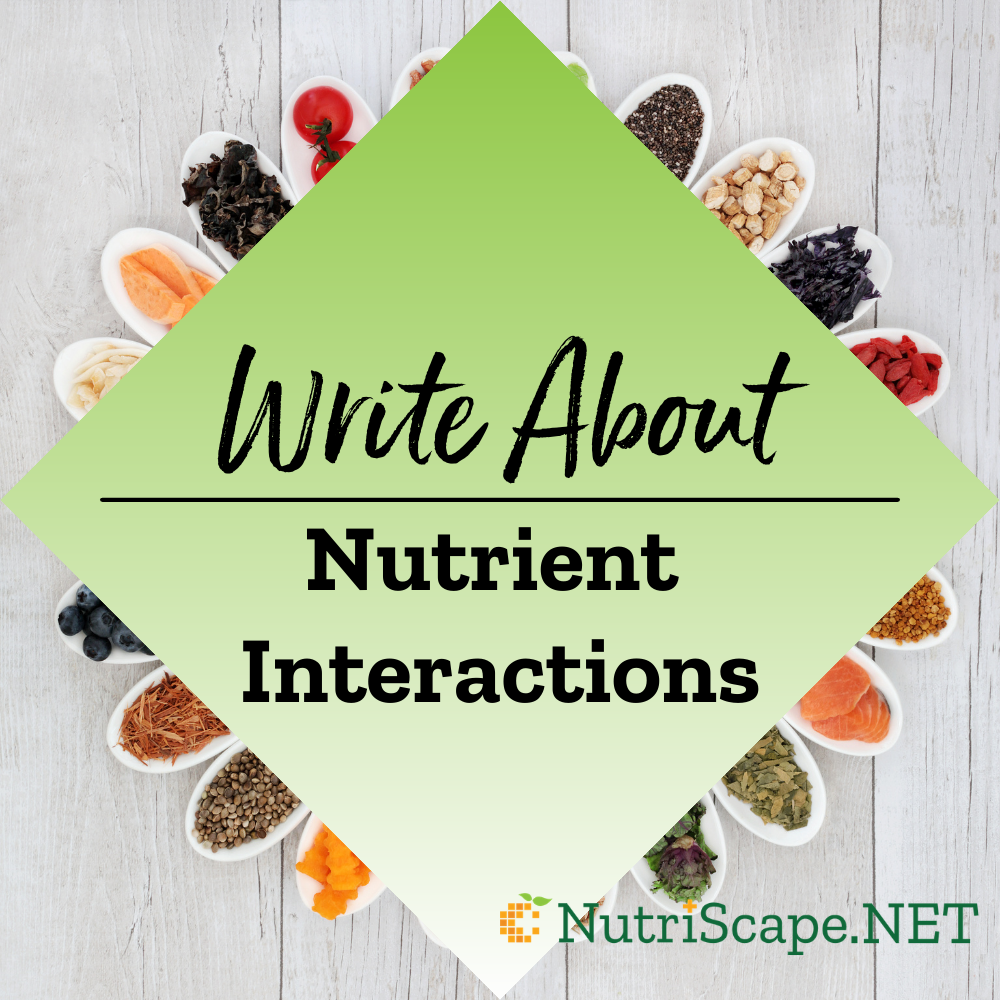
 The second possibility has to do with the effect that the nutrients may have on the liver. Medications are broken down in your liver and small intestine by a specialized group of enzymes called cytochrome P450 (CYPs). Many physicians often tell us not to eat grapefruit or drink grapefruit juice while taking a certain medication, and this is because grapefruit can interfere with certain enzyme processes within your body.
The second possibility has to do with the effect that the nutrients may have on the liver. Medications are broken down in your liver and small intestine by a specialized group of enzymes called cytochrome P450 (CYPs). Many physicians often tell us not to eat grapefruit or drink grapefruit juice while taking a certain medication, and this is because grapefruit can interfere with certain enzyme processes within your body. 
